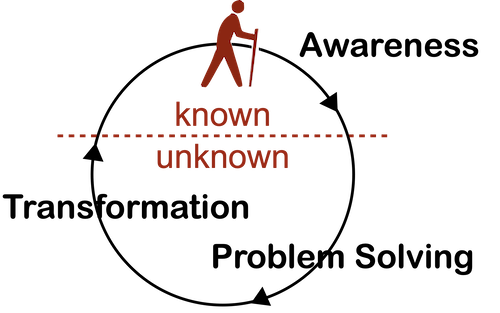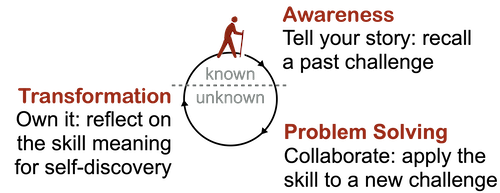Background
Resilience encourages using positive-coping skills to manage stress in an optimal way. Our objectives are to develop social support systems, positive-coping skills for resilience, self-esteem, self-efficacy (believing you are capable of reaching a goal), and problem solving skills. An entirely educational approach is used for learning resilience using the theme of the "Hero's Journey."  Common to many epic stories is the hero who, facing a challenge, goes on an adventure, is victorious, and returns as a transformed person. You are the hero in this journey.
Common to many epic stories is the hero who, facing a challenge, goes on an adventure, is victorious, and returns as a transformed person. You are the hero in this journey.
Read the following Why/How/Example Flashcard. Work on answering the questions in the Tell your story, Collaborate, and Own It exercises. Writing your responses will help you to better organize your thinking. You are most strongly encouraged to do the Collaborate exercise with another person so that you become aware of how to work with people within a social support system, people who can work with you on real life challenges. Refer to the workbook for a more in depth look at this skill and its exercises.
Trust Flashcard
Trust develops by using empathy to engage, reach out, and give support.
- Why: Social support is considered one of the best protections from the effects of stress and suicide. Trust is foundational to all relationships, whether personal, professional or organizational.
- How: Develop your social support system by identifying the challenge or challenges you may be facing. Consider people who would be helpful dealing with a challenge and the role each would play.
- Consider your challenge and identify your strengths and weaknesses to better identify your needs and the support you bring.
- Consider people who best meet your needs while assuring you are comfortable reaching out to them and they are comfortable reaching out to you. Recognize you are using empathy to "see through the eyes of another" to help determine their comfort level.
- Identify those individuals in your support system, the skills or qualities they provide, and how to contact them.
- Identify also the contributions you make to help keep your support system going.
- Example: I have an uneasy feeling that one of my friends may be thinking about suicide. I need a plan on how to approach my friend.
- My challenge is to help a friend who may be thinking about suicide.
- I realize that I am now part of this person's social support system and I have a role to play.
- I recognize suicide is one of the leading causes of death for teens and young adults.
- I am prepared to reach out to the person and listen.
- I question the person about the possibility of suicide.
- I persuade the person to get help.
- I refer the person to specialized help to include suicide hotline, getting the person to assistance or calling 911 if critical.
 Hero's Journey
Hero's Journey
-
Tell your story
Think about a time when you used something like Trust to successfully deal with a challenge. Answer the following questions. 1) What was your challenge? 2) What made you reach out to others? 3) Did you keep the social support system following the challenge?
-
Collaborate
Work with a companion and consider a real challenge you, your companion or someone you know is currently facing by applying the Trust skill. Answer the following questions. 1) What is the challenge? 2) What abilities or qualities does your companion have that can help with the challenge? 3) What are strengths and weakness related to the challenge? 4) Who best meets needs while assuring you are comfortable reaching out to them and they are comfortable reaching out to you? 5) What roles do they play, and how do you contact them?
-
Own it
Reflect upon the Trust skill and describe the skill in a few of your own words. You are adapting the meaning of the skill to be more useable and memorable.
 Common to many epic stories is the hero who, facing a challenge, goes on an adventure, is victorious, and returns as a transformed person. You are the hero in this journey.
Common to many epic stories is the hero who, facing a challenge, goes on an adventure, is victorious, and returns as a transformed person. You are the hero in this journey. Hero's Journey
Hero's Journey